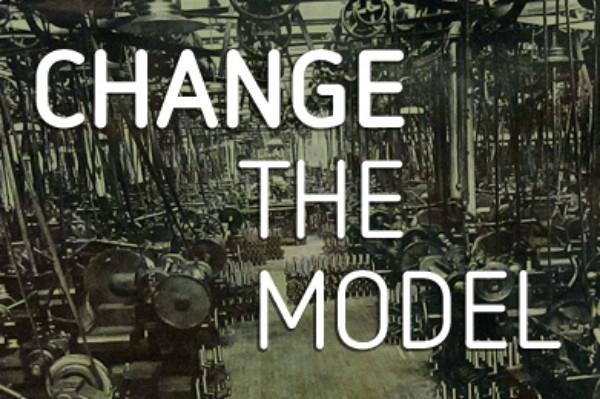
William Greider on the Necessity of Economic Transformation
[Editor's note: This synopsis of William Greider's keynote address at ECWD 2005 first appeared in GEO #68: Celebrating the 3rd Eastern Conference for Workplace Democracy. Although it was delivered almost 11 years ago, Greider's message is one that bears repeating still today. ]
"Be joyful even though you know all the facts."~Wendell Berry
 How a society organizes work is fundamental to the nature of the society and its ability to fulfill human potential. Citing work by the moral/political philosopher David Ellerman, Greider argued that the capitalist wage labor system is rooted in the feudal master-servant relationship. In his most recent book The Soul of Capitalism, Greider asks, "How can genuine individual freedom ever flourish except for a privileged few—or democracy ever be reconciled with capitalism—so long as the economic system functions along opposite principles, depriving people of rights and responsibilities, even denying their uniqueness as human beings?"
How a society organizes work is fundamental to the nature of the society and its ability to fulfill human potential. Citing work by the moral/political philosopher David Ellerman, Greider argued that the capitalist wage labor system is rooted in the feudal master-servant relationship. In his most recent book The Soul of Capitalism, Greider asks, "How can genuine individual freedom ever flourish except for a privileged few—or democracy ever be reconciled with capitalism—so long as the economic system functions along opposite principles, depriving people of rights and responsibilities, even denying their uniqueness as human beings?"
The idea that worker democracy is a moral alternative to the master-servant relationship inherent in the labor market is not new. Both the 19th century union movement and the social gospel movement of the early 20th century were proponents of worker cooperatives. Worker cooperatives and employee ownership are the road not taken in capitalism. Worker democracy still has the potential to be one of the fundamental principles of a moral transformation of capitalism.
Greider argues, tentatively, that we are perhaps entering an era in which the seeds of this moral transformation of capitalism are being sewed. Ideologically, with the end of the Cold War, it is possible to discuss the shortcomings of capitalism in a new context. Structurally, the economy is currently fundamentally unsound and must change. (e.g. "Debtor Nation", The Nation, 5/10/2004). The instability of the global capitalism is rooted in the mismatch between excessive global production capacity and inadequate demand which in turn is based on the gross inequality inherent to the system. Most importantly, Greider points to the "pioneers" of a new economy such as successful democratic worker cooperatives and social investment funds which are quietly modeling alternative social/economic relationships. Greider contends that the moral transformation of capitalism is going to come through creating real world alternative models not through national electoral politics. The current political system in Washington is too corrupted by money to lead the transformation.
To demonstrate the universal appeal of democratic work, Greider told a story of a conservative friend who upon his retirement decided to sell his company to his employees rather than to a larger corporation. The friend stated that the corporation would likely close the factory in several years, liquidate the assets, and move abroad. The friend felt an obligation to the workers and did not want to see his life work dismantled.
 Greider argues that democratic work is not only morally appealing, it is practical. Citing a review by John Logue and colleagues at The Ohio Employee Ownership Center (OEOC), Greider states the evidence suggest that democratic workplaces are more efficient and productive than traditional top-down businesses. Thus, there is not only a moral but a business rational for democratic work.
Greider argues that democratic work is not only morally appealing, it is practical. Citing a review by John Logue and colleagues at The Ohio Employee Ownership Center (OEOC), Greider states the evidence suggest that democratic workplaces are more efficient and productive than traditional top-down businesses. Thus, there is not only a moral but a business rational for democratic work.
If democratic work is such a great idea, why haven’t most Americans heard of it? What is missing from our vision? These ideas will not change the course of history unless they reach a much larger audience. Greider emphasized the importance of publicizing our successes. He also implored the audience to have faith. "You need to pretend everyday that you are part of the process of humanizing capitalism. The big changes in the 20th century required unbelievable effort and fortitude. For example, take the civil rights movement. You can’t plan that. People pushed a rock for years and then the contingence of history made the idea take off."
Well, what is needed to go forward? First, we need new financial institutions with the goal of providing direct equity investment into value oriented businesses. There should be local control over these investment funds. Pension funds are a possible source of capital for these institutions. Second, a moral economy must meet the challenge of scale. "Small needs to be both beautiful and viable." Greider is hopeful that technologies can be used across many businesses. Third, though the federal government is not the answer, governments can set up independent support organization for democratic work. He cited the OEOC as a model. The OEOC has assisted converting over 400 companies to worker cooperatives or Employee Stock Ownership Plans (ESOPS). Fourth, we need better strategies for educating the public about democratic work. He mentioned the movie The Take made by Avi Lewis and Naomi Klein which documents a worker takeover and democratic conversion of a factory during the recent economic crisis in Argentina, as a model of a captivating education tool.
Greider concluded, "Capitalism is a human construct not handed down by God or Adam Smith. It is sustained by a certain logic. If there is a visible alternative that people can point to, then people will demand change."
Go to the GEO front page

Add new comment